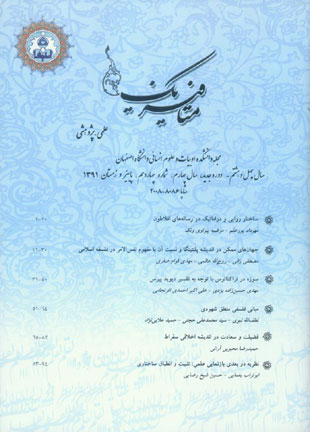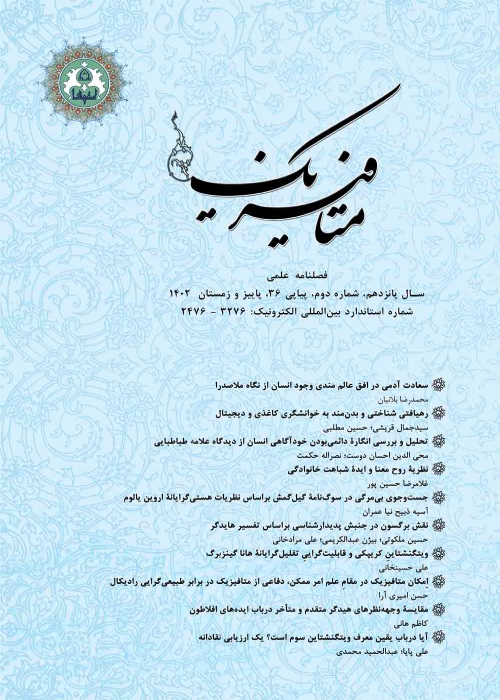فهرست مطالب

نشریه متافیزیک
سال چهارم شماره 2 (پیاپی 14، پاییز و زمستان 1391)
- تاریخ انتشار: 1391/10/11
- تعداد عناوین: 6
-
-
صفحه 1افلاطون دسته ای از هنرمندان (به ویژه شاعران) را به دلیل تاثیرگذاری منفی بر جوانان، از آرمانشهر خویش بیرون افکند ولی پیش از بیرون راندن آنان، داستانگویی و روایتگری را از ایشان گرفت و در زیر ردای فلسفه خود پنهان کرد. به یمن این شیوه های هنری است که تاثیرگذاری اندیشه های افلاطون در رساله هایش دو چندان گشت و همچنین کیفیتی زیبا یی شناختی و هنری به خود گرفت که در تاریخ اندیشه و هنر بشری پیوسته مورد تامل قرار گرفته است. رساله های افلاطون به دلیل داستانگویی و گفتگوی میان شخصیت ها، نمونه ای مناسب در بررسی این ادعاست که روایت می تواند شیوه ای برای دستیابی به شناخت باشد. در این مقاله، ساختار کلاسیک روایت به ویژه درام در یکی از شاخص ترین رساله های افلاطون به نام تئای تتوس به روش توصیفی - تطبیفی بررسی می شود تا روشن شود که این رساله نمونه ای از هنر افلاطون در کاربرد ساختار روایی برای انتقال معنا و اندیشه است و همچنین توان سنجیده شدن در چارچوب های دیگر از نگره های روایی را دارد.
کلیدواژگان: افلاطون، تئای تتوس، روایت، ساختار روایی، شناخت -
صفحه 13اگرچه به نظر میرسد مفاهیم ضرورت و امکان (مفاهیم وجهی) مفاهیم جداییناپذیر مابعدالطبیعه هستند، فلاسفه تجربهگرا به طور سنتی این مفاهیم را مورد نقد قرار دادهاند. در قرن بیستم نیز چنین انتقاداتی توسط کوآین(Quine) در قالبی جدید صورت گرفته است. با وجود این، طرح مفهوم تکثر جهانهای ممکن در معناشناسی منطق موجهات، زمینهساز این باور شد که میتوان بر چالش تجربهگرایی غلبه کرد. در تبیین سرشت جهانهای ممکن، دو رویکرد متفاوت وجود دارد. گروهی از فلاسفه از رویکرد نام گرایی تقلیلی در بیان مفاهیم وجهی استفاده میکنند و سایر مفاهیم وجهی را به مفهوم جهانهای ممکن تقلیل میدهند و در مقابل، برخی از فلاسفه معتقدند مفاهیم جهانهای ممکن، ضرورت، امکان، ذاتی و عرضی اجزای یک شبکه هستند. در این مقاله، پس از اشاره ای به رویکرد اول، انتقادی که پلنتینگا به عنوان نماینده شاخص جریان دوم به رویکرد نام گرایی تقلیلی وارد کرده است و همچنین تبیین او از ماهیت جهان ممکن شرح داده می شود و نشان داده خواهد شد که مفهوم کلیدی در اندیشه پلانتینگا وضعیت امور است و وی یک جهان ممکن را وضعیت اموری بیشینه میداند. این مسئله تبیین خواهد شد، که درک پلنتینگا از مفهوم جهانهای ممکن، با مفهوم نفسالامر در نظر حکمای مسلمان قابل تطبیق است اگرچه تمایزات مشهودی نیز با آن دارد.
کلیدواژگان: بالفع لانگاری، نام گرایی تقلیلی، جهان ممکن، وضعیت امور، نفسالامر -
صفحه 31سوبژکتیویسم یکی از بنیادی ترین زیرساخت های فلسفه جدید است. در فلسفه جدید، جایگاه سوژه در منظومه معرفت بشری رنگ و بوی دیگری به خود می گیرد. سوژه در برخی نگرش های فلسفی جدید نه تنها معیار معرفت تلقی می شود بلکه شان هستی بخشی نیز پیدا می کند. سوژه است که به غیر خود تعین می بخشد و موجودیت غیر سوژه مبتنی بر ابژه بودن آن برای سوژه می گردد. این نوشتار به تبیین جایگاه سوژه در منظومه معرفتی ویتگنشتاین متقدم می پردازد. به نظر می رسد همان گونه که کانت برای توجیه معرفت از من استعلایی بهره می گیرد، ویتگنشتاین برای توجیه تصویرگری پای سوژه متافیزیکی را به میان می کشد. هر زبانی می بایست از منظری فهمیده شود که نمی تواند در آن زبان ذکر و مشخص شود. سوژه یا «خود»، به مثابه این منظر نگریسته می شود. با توجه به تفاسیر مختلف و گاه متناقضی که از فلسفه متقدم ویتگنشتاین ارائه می شود، این بحث با توجه به تفسیر دیوید پیرس، یکی از مترجمان و شارحان بزرگ و پرآوازه تراکتاتوس، سامان می گیرد.
کلیدواژگان: سوژه، سوبژکتیویسم، سولیپسیسم، ویتگنشتاین، تراکتاتوس، دیوید پیرس -
صفحه 51منطق شهودی، به عنوان منطقی فلسفی و غیر کلاسیک، بیش از همه بر فلسفه شهودگرایی براوئر (Brouwer) و نظریات فلسفی او در مورد ریاضیات و منطق بنا شده است. این نظریات، رویکردی کاملا متفاوت را با رویکرد کلاسیک به منطق و ریاضیات عرضه می دارد. شهودگرایی براوئری، منطق را مقدم بر ریاضیات نمی شمرد و آن را نتیجه ای برساخته از روندهای ساخت هویات و براهین ریاضی می داند. در مقاله حاضر، به تبیین مبانی نظری منطق شهودی پرداخته خواهد شد. این نظریات شامل انتقادهای براوئر به ریاضیات و منطق کلاسیک و رویکرد خاص خود او به ریاضیات و منطق است.
کلیدواژگان: براوئر، منطق شهودی، شهودگرایی، ساخت گرایی براوئری، اصل طرد شق ثالث -
صفحه 65پرسش”سعادت چیست؟“از جمله مهم ترین پرسش هایی است که اندیشه فیلسوفان یونان باستان را به خود مشغول داشته بود. در آن دسته از محاورات اولیه افلاطون که به احتمال زیاد نمایانگر اندیشه سقراط هستند، سقراط به بررسی مسائل اخلاقی و می کوشد تا حد ممکن، تبیینی از چیستی فضیلت (یا فضایل)، زندگی سعادتمندانه و نسبت میان فضیلت (یا فضایل) و تحقق سعادت به دست دهد. در این مقاله، با قبول اصل سعادت باوری سعی شده است تا آرای سقراط درباره نسبت میان فضیلت و سعادت تبین شود و دفاعی از آنچه به «اصل حاکمیت فضیلت» معروف است ارائه گردد.
کلیدواژگان: اخلاق، سعادت، فضیلت، بسندگی فضیلت، نیک های بیرونی، حکمت -
صفحه 83هدف این مقاله فراهم آوردن نظریه ای ترکیبی از بازنمایی علمی است که نقاط ضعف نظریه های شناختی و غیرشناختی را نداشته باشد. برای این منظور، استدلال خواهد شد که اگرچه فرآیند بازنمایی نیازمند به کارگیری حیث التفاتی است، اما این حیث التفاتی برخلاف نظر مدافعان دیدگاه شناختی، صرفا در لباسی ساختاری بروز می دهد. بنابراین، نظریه پیشنهادی با وجود محترم شمردن حیث التفاتی، بازنمایی ساختاری را کافی می داند و حضور خصلت های زبانی مثل تعبیر یا دلالت را لازم نمی داند. بخش دوم مقاله، نظریه های بازنمایی را به صورت اجمالی معرفی می کند. بخش سوم به نقد نظریه ساختاری بازنمایی می پردازد. در بخش چهارم نشان داده می شود که فرآیند بازنمایی، متشکل از دو بخش یا دو بعد است: تثبیت و انطباق ساختاری. سرانجام در بخش آخر نشان داده می شود که علی رغم آنکه تثبیت، معطوف به ملاحظات التفاتی است، انطباق ساختاری رابطه ای عینی و غیرالتفاتی است.
کلیدواژگان: بازنمایی علمی، بازنمایی ساختاری، حیث التفاتی، تثبیت، انطباق
-
Page 1Plato did not allow many artists and poets into his Utopia Republic because of their bad and misleading influence on the young. But it seems that he learned storytelling and narrating from them and concealed what he learned beneath his philosophy. Thus, Plato's dialogues became more effective and gained aesthetic and artistic qualities. Theaetetus, one of the best known dialogues of Plato, is a conversation and discussion about episteme. Due to using classical dramatic structure, this dialogue is the most important dialogue with regard to dramatization of philosophical thoughts. The goal of this article is to study the dramatic structure of Plato's dialogues and show its potentials for interaction with narrative theories. It could be said that Plato's dialogues have many resemblances to the Greek drama and, today, we can call Plato a playwright. Thus, it is important and necessary to reread and reevaluate Plato's works via narratological view.Keywords: Plato, Theaetetus, narration, narrative structure, drama
-
Page 13Although the concepts of necessity and possibility (modal concepts) are inseparable concepts of metaphysics, the empiricist philosophers have traditionally challenged them. In the twentieth century, these criticisms were proposed by Quine in a new form. However, the emergence of the concept of possible worlds in semantics of modal logic made the belief that the challenge of empiricism may be defeated. In explaining the nature of possible worlds, there are two different approaches. Some philosophers believe that the concepts of possible worlds, necessity, possibility, essential, and accidental are members of a network. On the other hand, some philosophers use the reductive nominalism approach in describing the modal notions and reduce the other modal notions to the concept of possible worlds. In this article, after proposing Plantinga's criticism, as an outstanding representative of the first approach to the reductive nominalism, his standpoint to the nature of possible world will be discussed. The key concept in his thought is the state of affairs. He considers the possible world as a maximal state of affairs. Then, it will be shown that Plantinga's conception of the possible worlds can be adapted to the concept of Nafs-al-Amr in Islamic philosopher's view, in spite of obvious differences between them.Keywords: actualism, reductive nominalism, possible worlds, state of affairs, Nafs, al, Amr
-
Page 31Subjectivism is viewed as one of the most fundamental underpinnings of modern philosophy. In modern philosophy, subject takes up a new position in human knowledge. The formation of the concept of subject is a decisive turn with which the modern philosophy starts. Considering the centrality of subjectivism in modern philosophy, this article attempts to explain subject in Tractatus according to David Pears. A review of Wittgenstein’s earlier teachings reveals that he considers a fundamental limitation for language. The subject serves as a point of view from which the language can be understood. The subject is the presupposition of understanding. Another way of putting this would be to say that any experience is understood from a point of view which is not represented in that experience. Regarding this, it seems that earlier Wittgenstein is somehow subjectivist. This specific form of subjectivism is different from Kantian subjectivism.Keywords: subject, subjectivism, solipsism, Tractatus, Wittgenstein, David Pears
-
Page 51Intuitionistic logic, as a non-classical logic, encompasses the principles of logical reasoning which were used by L. E. J. Brouwer in developing his intuitionistic mathematics. Brouwer rejected the principle of the excluded middle on the basis of his philosophy. In his philosophical view, logic is the application of mathematics to the language of mathematics. In other words, logic studies the patterns that characterize valid inference. The resulting linguistic system of logic may be studied mathematically, even independently of the mathematical activities that it was originally abstracted from. In this paper, the philosophical basis of Brouwer’s view about Logic and Mathematics is explained.Keywords: Brouwer, intuitionistic logic, intuitionism, Brouwer's constructionism, law of excluded middle
-
Page 65The question of “what is happiness?” is among the most important questions of Greek philosophy. In those early works of Plato that very likely represent the views of Socrates, Socrates mainly focuses on moral issues and tries to get close to an explanation of the nature of virtue (or virtues), the happy life and the relation between virtue (or virtues) and the realization of happiness (Eudemonia). Given the Principle of Eudemonism, in this paper it is tried to examine Socrates’ views on the relation between virtue and happiness and defend what is known as the “Principle of the Sovereignty of Virtue”.Keywords: morality, happiness (Eudemonia), virtue, sufficiency of virtue, external goods, wisdom
-
Page 83Scientific representation is an interesting topic for philosophers of science, many of whom have recently explored it from different points of view. There are currently two competing approaches to the issue: cognitive and non-cognitive, and each of them claims its own merits over the other. This article tries to provide a hybrid theory of scientific representation, called Two-Dimensional Theory of Scientific Representation, which has the merits of the two accounts and is free of their shortcomings. To do this, we will argue that although scientific representation needs to use the notion of intentionality, such a notion is defined and realized in a simply structural form; contrary to what cognitive approach says about intentionality. After a short introduction, the second part of the paper is devoted to introducing theories of scientific representation briefly. In the third part, the structural accounts of representation will be criticized. The next step is to introduce the two-dimensional theory which involves two key components: fixing and structural fitness. It will be argued that fitness is an objective and non-intentional relation, while fixing is intentional.Keywords: scientific representation, cognitive approach, non, cognitive approach, intentionality, fixing, fitness


